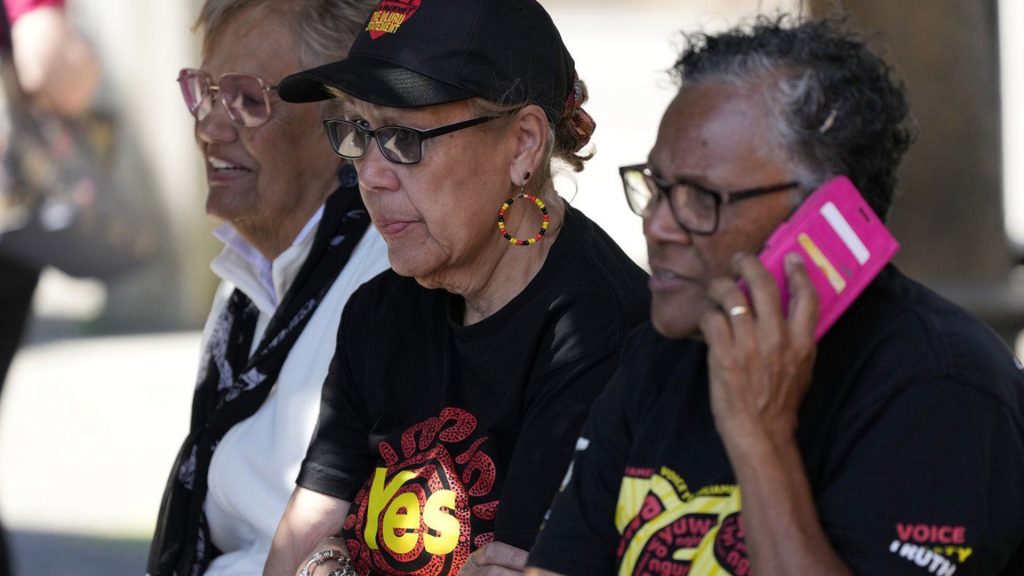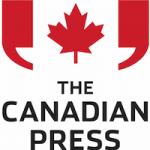
Indigenous women sit on a bench at a polling place in Redfern as Australians cast their final votes in Sydney on Saturday in their first referendum in a generation that aims to tackle Indigenous disadvantage by enshrining in the constitution a new advocacy committee. The prospect of an Indigenous Voice to Parliament has bitterly divided Australia's Indigenous minority as well as the wider community. Photo: Rick Rycroft/Associated Press
Australians resoundingly rejected on Saturday a referendum proposal to create an advocacy committee to offer advice to Parliament on policies that affect Indigenous people — the nation’s most disadvantaged ethnic minority.
The government proposed the first constitutional change since 1977 as a step forward in Indigenous rights. But the vote divided Indigenous leaders as well as the wider community.
More than 59 per cent of voters opposed the so-called Voice to Parliament with almost half the votes counted by Saturday. The loss is unofficial but is not contested.
Prime Minister Anthony Albanese blamed his political opponents’ campaigning against the measure for the failure. No referendum has ever succeeded without support of the major parties.
Albanese promised on the day he was elected last year to hold the referendum and accepted responsibility for his government’s decision to proceed despite evidence it was doomed.
“I had a duty, as a conviction politician, to put that to the Australian people,” Albanese told reporters.
Bipartisan support is widely regarded as essential for an Australian referendum’s success. Only eight of 45 referendums have succeeded in the constitution’s 122-year history.
Voice advocate Tanya Hosch, who spent a decade on developing the model, said she was devastated by the result.
“There’s going to be a lot of pain and hurt and dismay and we’re going to need to take a moment to absorb that message and what it says,” Hosch said.
Voice advocates had hoped that listening to Indigenous views would lead to more effective delivery of government services and better outcomes for Indigenous lives.
Opponents said the Voice would divide Australians along racial lines without reducing Indigenous disadvantages. They also said it could be a first step toward Indigenous claims for repatriation and compensation.
Accounting for 3.8 per cent of the population, Indigenous Peoples in Australia die on average eight years younger than the wider population, have a suicide rate twice that of the national average and suffer from diseases in the remote Outback that have been eradicated from other wealthy countries.
Opposition leader Peter Dutton accused Albanese of needlessly creating racial division over a doomed referendum.
“The prime minister was warned over the course of the last 16 or 17 months not to proceed with this divisive referendum and he owes the Australian public an apology for that,” Dutton said.
The country going forward
Australia will look for new ways to lift Indigenous living standards after voters soundly rejected a proposal to create a new advocacy committee, the deputy prime minister said on Sunday.
Every state and mainland territory apart from Australian Capital Territory voted against a proposal to enshrine in the constitution an Indigenous Voice to Parliament to advocate on behalf of the nation’s most disadvantaged ethnic minority.
Richard Marles said his government remained committed to improving Indigenous welfare to close the eight-year gap in average life expectancies between Indigenous Australians and the wider community.
“In terms of exactly what the precise steps forward are from here is a matter that we need to take some time to work through and I think people can understand that,” Marles told Australian Broadcasting Corp.
“Coming out of this referendum there is a greater call for action on closing the gap,” Marles added.
Indigenous Voice campaigners were flying Aboriginal flags at half-staff across Australia on Sunday as a mark of their disappointment.
There was majority support for the Voice in Outback polling booths in the Northern Territory. That part of the country has Australia’s highest proportion of Aboriginal residents and the result suggests the Voice was popular among Indigenous Australians.
Many Voice supporters accused opposition lawmakers of spreading misinformation and disinformation about the Voice.
Marcia Langton, an Indigenous academic who helped draft the Voice proposal, said opposition leader Peter Dutton through his “no” campaign had “cemented racism into the body politic.”
“The nation has been poisoned. There is no fix for this terrible outcome,” Langton wrote in The Saturday Paper.
Minister for Indigenous Australians Linda Burney, who is Aboriginal, told Indigenous people that the recent months of referendum campaign had been “tough.”
“But be proud of who you are. Be proud of your identity,” a tearful Burney said after conceding the referendum had been rejected.
“Be proud of the 65,000 years of history and culture that you are a part of. And your rightful place in this country. We will carry on and we’ll move forward and we will thrive,” she added.
It is the second time that Australians have rejected a referendum that would have included recognition of Indigenous people in the constitution.
When a referendum was last held in 1999, Australians rejected adding a preamble to the constitution — an introduction that carried only symbolic and no legal significance — acknowledging that Indigenous Australians had inhabited the country “since time immemorial” and were “honored for their ancient and continuing cultures.”
Australians have now rejected 37 referendums since the constitution took effect 122 years ago. Only eight have succeeded and none since 1977.
Story by Rod Mcguirk.










